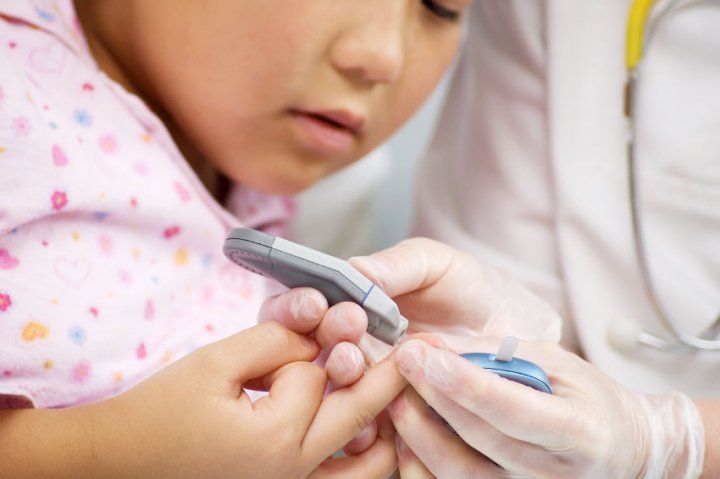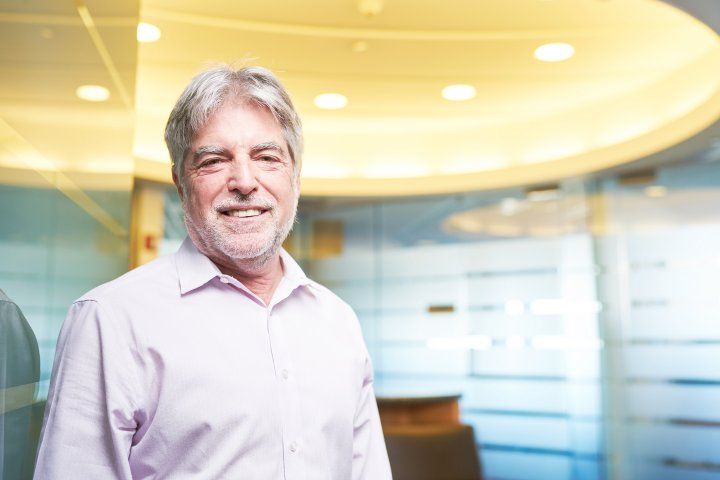Immunotherapy Delays Type 1 Diabetes Onset in People at High Risk
‘The science told us this should work, and so we kept at it,’ says key scientist after 33-year research journey
A two-week course of an experimental immunotherapy called teplizumab dramatically reduced type 1 diabetes (T1D) diagnosis rates in people at high risk for the disease, according to newly published phase II clinical trial results. This is the first time a drug has been able to delay or prevent the disease, which affects 2 million people in the United States.
“Type 1 diabetes is one of the most common chronic diseases of childhood, and is a real challenge to manage well, particularly for younger children. For years, finding a way to prevent the disease has been a major clinical goal,” said Stephen Gitelman, MD, a Trialnet Principal Investigator and Mary B. Olney, MD/KAK Distinguished Professor in Pediatric Diabetes and Clinical Research at the UCSF Diabetes Center.
Type 1 diabetes is one of the most common chronic diseases of childhood, and is a real challenge to manage well, particularly for younger children. For years, finding a way to prevent the disease has been a major clinical goal.
UCSF is one of 28 sites that participated in the Teplizumab Prevention Study, conducted by TrialNet, the largest clinical trial network ever assembled to discover ways to delay and prevent T1D.
“This is the first trial to successfully delay diagnosis of T1D in at-risk individuals,” said study chair Kevan Herold, MD, a professor of immunobiology and internal medicine at Yale University. “It is all the more remarkable that a single 14-day course of this drug was able significantly reduce the number of patients who have been diagnosed even six years into the trial.”
Teplizumab is an anti-CD3 monoclonal antibody originally developed in the 1980s by Jeffrey Bluestone, PhD, and colleagues at the University of Chicago and collaborators at Ortho Pharmaceutical Corp. Bluestone, now a member of the UCSF Diabetes Center and leader of the Parker Institute for Cancer Immunotherapy, has shown with Herold, Gitelman, and others that the drug interferes with the body’s autoimmune destruction of its insulin-producing cells and can slow the progression of T1D in people with a recent diagnosis.
Median Delay of Two Years
The new TrialNet study set out to test if the drug could also delay onset of T1D in individuals at very high risk of developing the disease. Herold presented results of the trial June 9 at the American Diabetes Association’s 79th Scientific Sessions in San Francisco, and the findings were simultaneously published online by The New England Journal of Medicine.
The researchers enrolled 55 children and 21 adults with a family history of T1D, whose blood also showed high autoimmunity and abnormal blood sugar levels, as identified by TrialNet’s Pathway to Prevention screening program. These individuals are thought to have a lifetime risk of clinical diagnosis nearing 100 percent.

Type 1 diabetes impacts 2 million people in the United States.
However, the study found that a two-week course of teplizumab reduced annual T1D diagnoses in these high-risk individuals by nearly 60 percent: on average, 36 percent of participants who were randomly assigned to receive a placebo treatment were diagnosed each subsequent year, compared to only 15 percent of those who were treated with teplizumab. Ultimately, median time to diagnosis was delayed by two years – from 24 months in the placebo group to 48 months in the treated group – with a higher percentage of teplizumab-treated participants remaining diabetes-free at the end of the trial.
“A median delay of two years compared to a lifetime of diabetes might not sound like a lot, but treating a 10-year-old instead of an 8-year-old or an 18-year-old instead of a 16-year-old is a very big difference, from a clinical perspective,” said Gitelman, who directs the UCSF Diabetes Center’s pediatric diabetes program. “Showing for the first time that we have the ability to prevent progression to T1D will be a major boon to these at-risk individuals and their families.”
Samples collected during the trial are being studied to help researchers understand why certain people responded to teplizumab better than others. Next, TrialNet researchers hope to conduct additional studies to look for ways to extend the benefits of teplizumab, such as whether multiple courses of the drug could help extend its benefits.
Building on the new observations, Gitelman will be leading several new T1D clinical trials at UCSF, including a new multi-center TrialNet prevention trial combining two different FDA-approved immunotherapies targeting both B and T immune cells in an attempt to delay onset of T1D in at-risk children and young adults; a multi-center phase III trial of teplizumab in patients with new-onset diabetes called PROTECT; and another trial evaluating the use of a modified gut bacterium in combination with teplizumab to protect insulin-producing cells in children following T1D diagnosis.
Bluestone Reflects on Over Three Decades of Research
Bluestone began developing teplizumab in 1986 in with colleagues at the University of Chicago and Ortho Pharmaceutical Corp., as a way to target aggressive immune cells called CD3+ T cells, which had been implicated in organ transplant rejection and multiple autoimmune diseases, such as T1D.
More than three decades later, Bluestone – now A.W. and Mary Margaret Clausen Distinguished Professor of Endocrinology and Metabolism and director of the Hormone Research Institute in the UCSF Diabetes Center and president and CEO of the Parker Institute for Cancer Immunotherapy – looks back on the idea that antibodies could target CD3+ T cells to potentially disrupt or prevent diabetes as a prescient one.

Jeffrey Bluestone, PhD, began developing teplizumab in 1986 in with colleagues at the University of Chicago and Ortho Pharmaceutical Corp.
“It is hard to believe this now, when half of the drugs that come to market these days are monoclonal antibodies, but at the time, many pharmaceutical companies didn’t believe that biologics like antibodies would make it as drugs. They were thought to be too complex, hard to make and expensive,” Bluestone said. “But we knew that the value of specificity and selectivity of these agents, combined in the case of teplizumab with strong immunomodulatory effects, could be a potent therapeutic for autoimmune disease.”
In the 1990s, Bluestone began partnering with Herold, a former colleague at the University of Chicago, to move teplizumab into clinical trials. Promising early results led Eli Lilly and Company to partner with Maryland-based MacroGenics, but after it failed to significantly slow diabetes progression in a pivotal phase III trial, the drug-maker halted further development in 2010. Then, based in part on positive results of a 2013 phase II trial showing that teplizumab slowed progression of T1D in patients with a recent diagnosis, New Jersey-based Provention Bio purchased rights to the drug in 2017 and resumed clinical development with a focus on diabetes prevention. Bluestone joined Provention’s board in 2019.
“It has been a long road, and a testament to the perseverance and passion of the many people who have been committed to this effort – in some cases, for decades – because they saw the potential of this approach to treat and prevent type 1 diabetes,” Bluestone said. “We’ve always stayed very focused on understanding how the drug was altering the dysfunctional autoimmune system. In the end, that’s why I’ve believed in this drug for more than 30 years. It’s not just something we threw at the wall and hoped would stick – the science told us this should work, and so we kept at it.”
“It’s important to remember we’re still at the end of the beginning, not the beginning of the end,” he added. “The key next step of course is seeing whether this drug can cross the finish line through upcoming Phase III trials and get approved by the FDA. There’s still lots to do – but hopefully this speeds things up a bit.”
Disclosures: Bluestone has a financial interest in the drug and is a member of the board of directors of Provention Bio, which owns development rights to the drug.
UC San Francisco (UCSF) is a leading university dedicated to promoting health worldwide through advanced biomedical research, graduate-level education in the life sciences and health professions, and excellence in patient care. It includes top-ranked graduate schools of dentistry, medicine, nursing and pharmacy; a graduate division with nationally renowned programs in basic, biomedical, translational and population sciences; and a preeminent biomedical research enterprise. It also includes UCSF Health, which comprises three top-ranked hospitals – UCSF Medical Center and UCSF Benioff Children’s Hospitals in San Francisco and Oakland – as well as Langley Porter Psychiatric Hospital and Clinics, UCSF Benioff Children’s Physicians and the UCSF Faculty Practice. UCSF Health has affiliations with hospitals and health organizations throughout the Bay Area. UCSF faculty also provide all physician care at the public Zuckerberg San Francisco General Hospital and Trauma Center, and the SF VA Medical Center. The UCSF Fresno Medical Education Program is a major branch of the University of California, San Francisco’s School of Medicine.